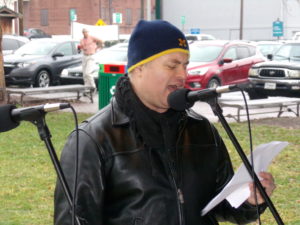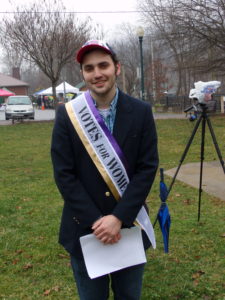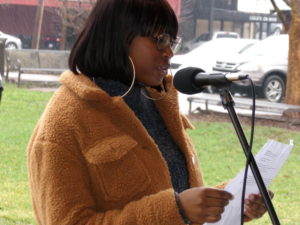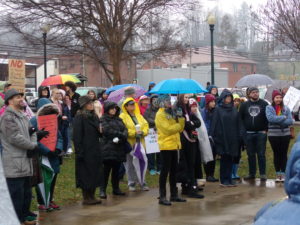Hundreds were present at the Sylva Women’s March 2020. Photo by Benito Garcia-Garcia
As the 2020 presidential elections loom 10 months away, political tensions can be felt across the country. Even in small town America, citizens are discussing the issues that matter most to them from women’s rights, to voter ID regulations, to healthcare, among other issues – and that certainly was the case in Sylva on Saturday afternoon, Jan. 18.
Hundreds of people showed up in chilly and rainy conditions in downtown Sylva to participate in the Women’s March (turned rally due to weather) hosted by the Jackson county organization Indivisible-Common Ground-Organizing for Action (OFA)-WNC.
The march was centered around the centennial celebration of the passing of the 19th amendment which granted women the right to vote. Demonstrators carried signs like “for the women who marched before me,” while another one read, “we are women hear us vote.” There was also an anti-Trump atmosphere present at the rally with signs like “evict Putin’s puppet.”
The Women’s March began in 2017 as a protest against President Trump and has had re-occurring sister marches across the country.
See more photos from the event.
There were multiple speakers during the event. Representative from the North Carolina General Assembly, Joe Sam Queen (Dem) spoke about the importance of standing in solidarity with women and the importance of everyone voting.
Dr. Enrique Gomez, an associate professor of Physics and Astronomy at WCU and president of the Jackson County NC NAACP (National Association for the Advancement of Colored People), delivered one of the most passionate and emotional speeches of the event.

Dr. Enrique Gomez, WCU professor and president of the Jackson County NC NAACP, speaking at the Sylva Women’s March 2020. Photo by Benito Garcia-Garcia
“We should not live a world where people who want to exercise their right to run for office, participate in politics, exercise free speech fear for their lives in this country or any country,” Dr. Gomez said after telling the crowd he was mourning the death of his uncle who was murdered while running for public office in Mexico.
He added that we shouldn’t live in a world where mothers fear sending their children to school, or people fearing going to their places of worship, or even going to a Walmart – alluding to the tragedies that have tainted this country throughout the earlier decade.
Dr. Gomez spoke much about the threat that minorities face during election season – voter suppression. He spoke about a Trump re-election strategist, Justin Clark, saying the Republican party relied on voter suppression to win swing states.
He also spoke about the victory that the North Carolina NAACP had in 2016 when a federal court determined that the North Carolina General Assembly had unconstitutionally and racially gerrymandered two congressional districts. Adding that the solution to these issues is to have a “massive voter turnout” – this became a slogan which the crowd chanted repeatedly.
The president of the Student Democracy Coalition (SDC) at WCU, Sara Mears, spoke about the importance of civic engagement not only on college campuses but throughout communities. She talked about the success of the SDC saying, “in the 2018 midterm elections, 71.7% of all Western Carolina University students were registered to vote…our overall voting rate was 31.8%…that is nearly doubled from 2014 midterm elections.” Mears said that over 3,400 students voted in 2018 and she expects those numbers to rise in the 2020 elections.
Mears also spoke about how this didn’t happen overnight, it was a process that “happened because of coalition building and collaborative thinking…this happened because we took the steps to really build this up at our school.” Adding that the change came from all parts of the WCU community including the Latinx Appreciation Student Organization and the Black Student Union, as well as all those students who are “dedicated to something bigger than themselves.”

Former WCU student, Ronnie Davia, before the march began. Photo by Benito Garcia-Garcia
Ronnie Davia, a former WCU student and current Asheville resident, spoke about the injustices women face and had strong comments about President Trump and policies his administration has implemented. Since his time at WCU, Davia has worked on five federal democratic campaigns including 2016 Democratic nominee, Hillary Clinton. Currently, Davia is a field organizer for presidential candidate, Michael Bloomberg.
Davia spoke about how more needs to be done on college campuses to prevent women from getting raped, claiming that a button that calls 9-1-1 is not enough. He also mentioned how it makes no sense that women get paid less for the “same exact amount of work” that men do. Adding that “we need to prevent racism, Islamophobia, anti-Semitism, [and] misogyny.”
Davia had strong comments about President Trump saying, “this president, if he’s elected once more, truly is going to be a stain on American textbooks.” Adding that evidence suggests “more people across this nation are going to die…mainly women of color, transgender, and good people of the LGBTQ community.” Davia also spoke about healthcare and how inaccessible it has become for some people.
He also made strong comments about the Zero Tolerance Policy implemented by the Trump administration that separated children from their migrant parents seeking asylum at the US-Mexico border. Davia said, “we have had multiple die on our own border in asylum. Kids that have the flu [and are malnourished] …they’re getting foil blankets.” Also adding, “America at this point in time is directly responsible for the deaths of those children. And that is hard, that is blood in our hands.” Davia continued by saying that the next president had to be democrat, regardless of who the nominee is.
Davia concluded by imploring everyone to register to vote and to get as many people to do so as well.

Brittney Windham, president of the Black Student Union at WCU, speaking at the Sylva Women’s March 2020. Photo by Benito Garcia-Garcia
Brittney Windham, president of the Black Student Union, concluded the event with an empowering message to women. Windham started by saying, “this march is to push through the oppression, the inequality, the blatant disrespect we women all face on a daily by dismantling the oppressive system through non-violent resistance.” Windham declared her passion for the empowerment of women, especially women of color. She added that the modern civil rights movement would not be the same without the contributions of black women.
After almost two hours of rain and cold wind, Windham left the marchers with a symbolic message, “We must remember that where there is no struggle, there is no strength. So, we must go through the rain to get to the rainbow.”




